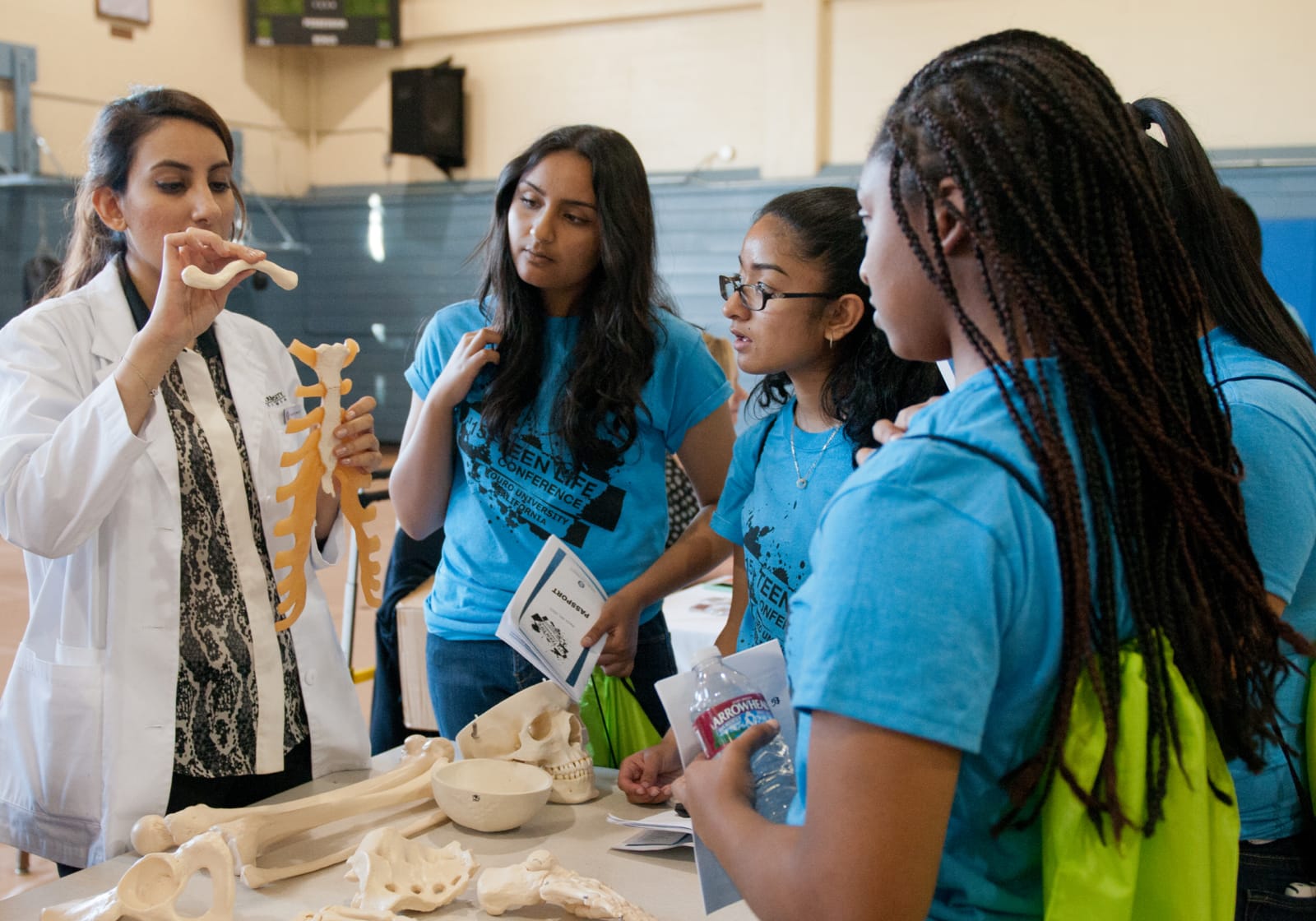
About
Join us and become a leader in addressing public health challenges.
You'll learn to achieve health equity by addressing the historical roots and structural causes of injustice.
The Time is Now
At this critical juncture in history, the world has come to understand what we at Touro University California have known all along: Public Health matters. Our well-established, vitally important Public Health Programs offer a comprehensive, innovative, supportive way to expand your knowledge and amplify your ability to serve.
Because we understand the many challenges and conditions influencing public health delivery and public health practitioners today, we weave a social justice thread throughout our curriculum. Our broad-based, inclusive approach allows TUC students and graduates to understand the human and human-rights issues surrounding healthcare in this country and throughout the world.
We offer flexible class schedules that are stacked within 2 or 3 days per week leaving open the possibility of part-time work. We also offer many courses in a hybrid format with course instruction that alternates between online and in-person meetings weekly.
Our Mission
- We promote the health and well-being of local and global communities through education, service, and research.
- We blend clinical and public health knowledge in our joint and dual degree programs.
- We work with under-resourced communities to build their responses to public health problems.
- We embrace TUC's “social justice” mission and work in partnership with public and private sectors to build community strengths.
- We focus on community health, global health, and health equity, and criminal justice, in our independent MPH program.
Our Goals
- Help students develop, promote, and comprehend public health principles ensuring all program graduates can demonstrate knowledge and skill in the core areas of public health.
- Prepare students to practice successfully in diverse health service, academic, and research settings.
- Help faculty and students develop and participate in research to improve public health.
- Collaborate and consult with community agencies and others committed to improving public health.
- Evaluate and continuously improve the education, research, and service activities of the program.
Public Health Competencies
All Concentrations
- Apply epidemiological methods to the breadth of settings and situations in public health practice
- Select quantitative and qualitative data collection methods appropriate for a given public health context
- Analyze quantitative and qualitative data using biostatistics, informatics, computer-based programming, and software, as appropriate.
- Interpret results of data analysis for public health research, policy, or practice
- Compare the organization, structure, and function of health care, public health,h and regulatory systems across national and international settings
- Discuss the means by which structural bias, social inequities, and racism undermine health and create challenges to achieving health equity at organizational, community, and societal levels
- Assess population needs, assets, and capacities that affect communities’ health
- Apply awareness of cultural values and practices to the design, implementation, or critique of public health policies or programs
- Design a population-based policy, program, project, or intervention
- Explain the basic principles and tools of budget and resource management
- Select methods to evaluate public health programs
- Discuss multiple dimensions of the policy-making process, including the roles of ethics and evidence
- Propose strategies to identify stakeholders and build coalitions and partnerships for influencing public health outcomes
- Advocate for political, social,l or economic policies and programs that will improve health in diverse populations
- Evaluate policies for their impact on public health and health equity
- Apply leadership and/or management principles to address a relevant issue
- Apply negotiation and mediation skills to address organizational or community challenges
- Select communication strategies for different audiences and sectors
- Communicate audience-appropriate (i.e., non-academic, non-peer audience) public health content both in writing and through oral presentation
- Describe the importance of cultural competence in communicating public health content
- Integrate perspectives from other sectors and/or professions to promote and advance population health
- Apply systems thinking tools to a public health issue
Community Action for Health Concentration
- Demonstrate an understanding of the mechanisms and pathways by which social, economic, and historical factors contribute to health inequities and result in health disparities in the United States
- Identify and analyze strategies aimed at reducing social inequities in health
- Demonstrate competence using specific community health planning data sources to assist community collaborative groups in program/action prioritization
- Apply community-based participatory approaches to the development and implementation of community research, interventions, and policies
Global Health Concentration
- Analyze global health determinants, measurements, burdens, and challenges.
- Synthesize social, economic, and political forces shaping global health with solutions for harm reduction and improved health outcomes
- Apply global health policy and intervention strategies to address health problems in low-and-middle-income countries (LMICs)
- Synthesize the relationship between culture, health systems, human rights, and global health inequities.
- Analyze ethical issues in global health work within diverse economic, political, and cultural contexts.
- Examine the historical origins of the U.S. criminal justice system and analyze the development of legal systems and the impacts of mass incarceration.
- Examine U.S. law and public health at the intersection of the criminal justice system.
- Investigate how systemic oppression, racism, and discrimination fuel justice-involvement and its impacts on public health.
- Evaluate the collateral consequences of criminal justice policy at local, state, and federal levels and their impact on community health and well-being.
- Examine the cumulative effects of police violence on community trauma as a social determinant of health
- Demonstrate an understanding of the mechanisms and pathways by which social, economic,c and historical factors contribute to health inequities and result in health disparities in the United States.
- Identify and analyze strategies aimed at reducing social inequities in health
- Demonstrate competence using specific community health planning data sources to assist community collaborative groups in program/action prioritization.
- Apply community-based participatory approaches to the development and implementation of community research, interventions, and policies.
- Analyze global health determinants, measurements, burdens, and challenges.
- Synthesize social, economic, and political forces shaping global health with solutions for harm reduction and improved health outcomes
- Apply global health policy and intervention strategies to address health problems in low-and-middle-income countries (LMICs)
- Synthesize the relationship between culture, health systems, human rights, and global health inequities.
- Analyze ethical issues in global health work within diverse economic, political, and cultural contexts.
Health Equity and Criminal Justice Health Concentration
- Examine the historical origins of the U.S. criminal justice system and analyze the development of legal systems and the impacts of mass incarceration.
- Examine U.S. law and public health at the intersection of the criminal justice system.
- Investigate how systemic oppression, racism, and discrimination fuel justice-involvement and its impacts on public health.
- Evaluate the collateral consequences of criminal justice policy at local, state, and federal levels and their impact on community health and well-being.
- Examine the cumulative effects of police violence on community trauma as a social determinant of health
- Formulate, analyze, and advocate for policies aimed at improving the health of populations impacted by the criminal justice system.
MPH Leadership

Gayle Cummings, PsyD, MPH
Assistant Dean & Program Director
Public Health Program Director, Gayle Cummings, received her MPH from the School of Public Health at UC Berkeley and did an NIH Fellowship with the Center for AIDS Prevention Studies at UCSF.
She co-founded the Center for the Analysis of Multicultural Issues (CAMI), a firm, that conducts program and research evaluation, strategic planning and analysis for disease prevention and health promotion programs.
As co-principal and consultant for CAMI, she helped develop, implement, and evaluate programs focused on assisting underserved communities throughout California.
Accreditation
TUC Accreditation
Touro University California is accredited by WASC Senior College and University Commission (WSCUC).
MPH Accreditation
The Touro University California (TUC) Public Health Program is accredited by the Council on Education for Public Health (CEPH). On December 9, 2022, the TUC Public Health Program received notice of accreditation from the Council regarding the decision of its Board of Councilors to reaccredit the MPH Program at TUC for a 7-year term, the maximum period of accreditation for a graduate public health program
